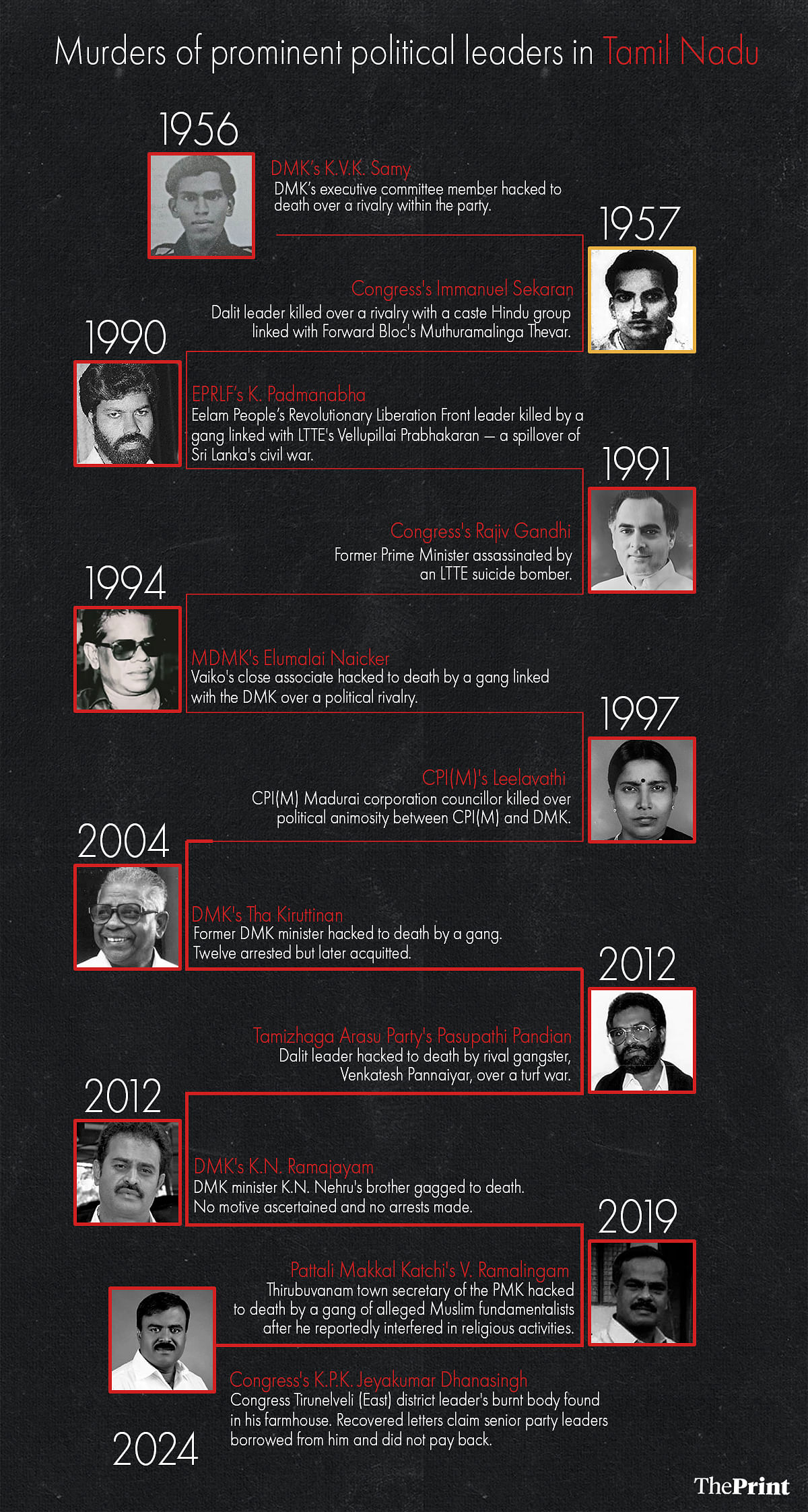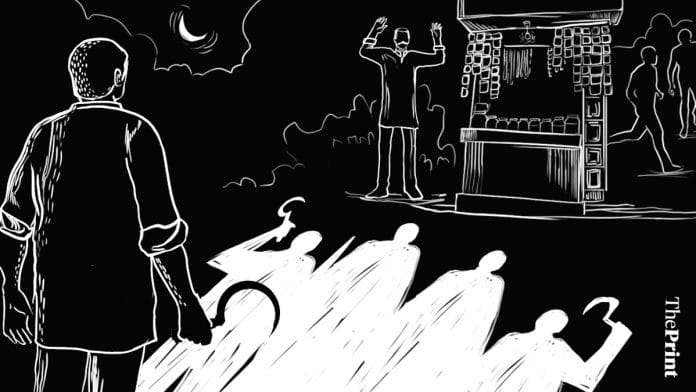Chennai: It was pitch black on the night of 11 September, 1957. Immanuel Sekaran, a freedom fighter, Congressman and Dalit leader, was chatting with his friends at a betel shop close to his house near Paramakudi in Tamil Nadu’s Ramanathapuram district.
A bus plying to Mudukulathur halted near Paramakudi at roughly 9.30 pm and 10 men carrying sickles ran towards Sekaran, asking if he was the man who had spoken up against Maravar leader and then Forward Bloc MP Muthuramalinga Thevar over the 1957 Mudukulathur riots.
Within minutes, Sekaran had been hacked to death.
In the post-Independence era, this was one of the first murders of a political leader over political differences in what was then Madras State.
Sekaran, who led the Dalit movement in Ramanathapuram in the mid-1900s, is also considered a victim of caste oppression.
“It was the day when the voice of Dalits in the Ramanathapuram was stopped,” writes K.A. Manikumar, a former history professor at Tirunelveli’s Manonmaniam Sundaranar University, in his book, Murder in Mudukulathur, while discussing Sekaran’s murder.
Sixty-seven years later, in June this year, the murder of another Dalit leader, K. Armstrong of the Bahujan Samaj Party, caused an uproar in the state. But there’s a stark contrast in the motives — political murders in the past couple of decades have increasingly been the fallout of business disputes and gang rivalry, not politics.
Recent murders ‘not for political reasons’

Murders over political differences are a matter of the past.
According to analysts and academicians, the recent spate of murders of politicians in Tamil Nadu is largely a fallout of the game for one-upmanship in illegal business activities, including usury and recovery of loans and ‘mamool (unofficial collections)’ from those involved in illegal sand mining and quarry stone mining.
“Those killed in the recent past are politicians. But, largely, the reasons for their murders are not political. Both the victim and the accused in such cases were involved in illegal activities,” said A. Ramasamy, a professor and former head of the Tamil language department at Manonmaniam Sundaranar University.
In the past as well, Ramasamy added, caste and personal rivalry, rather than political differences, have always factored into the murders of politicians in Tamil Nadu.
A retired director general of police (DGP), on the condition of anonymity, said the trend of rowdies and gangsters seeking the support of prominent politicians goes back in time but, now, they want to be political leaders.
“In the last decade, people involved in illegal activities have wanted to join political parties to have a say in their own business, instead of depending on another politician for that,” the retired DGP told ThePrint.
According to the Association for Democratic Reforms (ADR), of the 224 MLAs in Tamil Nadu, 134 have declared criminal cases in their affidavits. Of the 950 candidates in the recently held Lok Sabha election, 137 declared criminal cases against them and 80 declared serious criminal cases against them.
Political commentator Maalan Narayanan also said that unlike in Kerala and West Bengal, the murders of politicians in Tamil Nadu in recent years are not political.
“The murders are largely a fallout of the real estate business. Once the people in the real estate business join a political party, irrespective of whether the party is in power, they have a say in the locality,” said Narayanan.
“Murder of politicians has always been there — ever since Independence. But, now, there’s a new wave of killing politicians by deploying gangsters for money. It is more or less becoming acceptable in the state, which is a dangerous trend,” said political analyst N. Sathiya Moorthy, speaking to ThePrint.
Also read: Days after Tamil Nadu BSP leader’s murder, NTK functionary hacked to death ‘with sickles’ in Madurai
Gangsters behind murders
In the CCTV footage released by the police of Armstrong’s murder, a group of men wearing the red and orange dresses of food delivery executives are seen hacking a man to death in the narrow lanes of Perambur on 5 July.
In a matter of 30 seconds, the gang fled the spot, leaving the man in a pool of blood. Armstrong died minutes after the attack.
As many as 20 people, including DMK, AIADMK, BJP, and TMC workers, have been arrested in the case, so far, but the motive is yet to be ascertained.
The police, however, suspect that Armstrong was murdered in retaliation for the killing of gangster Arcot Suresh, who was involved in the Aarudhra gold scam. While trying to help depositors who lost money in the scam, Armstrong had drawn Suresh’s ire before the gangster’s murder. The brother of Arcot Suresh, Ponnai Balu, is the prime accused in the Armstrong murder, said the police.
According to political experts, the rise of gangster culture started during the first AIADMK regime in 1977 and, subsequently, the DMK embraced it as well after assuming power in 1989.
However, gangster culture developed deep roots between 1991 and 1996, said Sathiya Moorthy.
“At least one goon in each locality claimed to be linked with Sasikala. AIADMK encouraged them to join the party and used them to threaten people who opposed it. That is when the system of gangsters took deep roots,” Moorthy said.
Later, as gangster culture became normalised, former DMK minister Tha Kiruttinan was hacked to death in May 2003 by a bike-borne gang near his residence in the Madurai district of the state.
Subsequently, in December 2004, a three-member gang hacked former DMK minister Aladi Aruna to death during her morning walk.
“All the accused in the murder of politicians before 2000 had political connections. They either belonged among the cadre of a rival political party or the same political party. But, it was Tha Kiruttinan’s murder where gangsters were hired,” Ramasamy said.
At least 12 people were arrested, and after the DMK came to power in 2006, the trial was transferred to Andhra Pradesh. But, in 2008, a trial court acquitted all the accused persons, including former Chief Minister M. Karunanidhi’s son M.K. Alagiri.
Another political murder that shook the state and also remains unresolved is the murder of K.N. Ramajayam, the brother of DMK leader and municipal administration minister K.N. Nehru.
The 50-year-old Ramajayam left his house at roughly 5.15 am on 29 March and did not return. His body was found a day later — he had been gagged to death.
Two decades on, the police have not arrested a single person in the case, so far.
A similar case in recent days is the death of Tirunelveli East district Congress chief K. Jayakumar Dhanasingh.
The charred body of Jayakumar was found three days after he went missing on 5 May this year. The case remains unresolved as well.
Law & order in question
AIADMK leader and former minister D. Jayakumar, however, denied the rise of gangster culture during the AIADMK’s rule, calling it a lie propagated against the party.
“When the AIADMK was in power, there were no such political or gangster killings in public. Only after the DMK came to power did gangsters show no fear of killing their rivals in full public view. The DMK does not know how to keep the people safe and preserve law and order in the state,” Jayakumar said.
Political commentator Maalan Narayanan said the police have become incompetent in cracking complicated cases in recent years.
“They can easily get hold of those who commit cyber crimes because it is easy to do, but, when it comes to such complex cases in which there is CCTV footage, the police find those difficult. Sometimes, they don’t find the accused for months altogether. The police are failing to make people follow the law and keep the state in order,” Narayanan said.
Ramasamy said the DMK government has always been targeted on the law and order issue because other issues have not gained traction.
“When the government is secular, the only way politicians can target the government is on the law and order situation,” Ramasamy said.
The DMK government has lost elections two times over law and order, he further said, adding that the opposition parties now feel that it will be easy to derail the government again by raking up the issue.
During the Lok Sabha campaign, Prime Minister Narendra Modi had questioned the law and order situation in Tamil Nadu.
Chief Minister M.K. Stalin countered it by releasing a list of BJP workers with criminal records in March this year.
“When all the rowdies are in your party, what right do you have to speak about the law and order in our state?” he asked.
Then, in July this year, BJP TN chief K. Annamalai released a list of over 100 alleged DMK workers with a criminal background.
Terming the DMK as “Crime Munnetra Kazhagam”, Annamalai said, “All the people on the list have been involved in major crimes only after DMK came to power in 2021.”
Also read: After Mayawati, DMK allies VCK & Congress demand arrest of ‘real culprits’ in BSP leader murder case
Three murders within 24 hours
Even though a majority of the latest murders of politicians were over personal or business enmity, the state is still under pressure over the chain of murders.
On 27 July and 28 July, three people, all functionaries at various political parties, were killed by henchmen over personal enmity from the past.
In the first incident on Saturday night, BJP functionary Selvakumar from the Sivagangai district was hacked to death by a gang of five.
Sivagangai police said the accused killed Selvakumar as he had made a gang kill one of them, Bhuvaneshwaran, in 2019 over some personal enmity.
In another incident in Cuddalore district, AIADMK ward secretary R. Badmanaban was hacked to death on Sunday morning.
A year ago, Badmanaban and his friends had allegedly been involved in the murder of one Baskar in Cuddalore over a fight at a puberty dance function.
Badmanaban had been out on bail for a year before Baskar’s death was avenged.
Similarly, Jackson, a Congress functionary in Kanyakumari, was hacked to death on Sunday.
Kanyakumari police, who are investigating the case, said it could be “a murder for revenge”, as well.
Last year, history-sheeter Rajkumar was arrested based on a complaint filed by Jackson. Police suspect Rajkumar’s gang members are involved in Jackson’s murder.
Though these were not strictly political murders, they have still stirred protests across the state.
(Edited by Madhurita Goswami)
Also Read: Youth hacked to death ‘by wife’s brothers’ in Tamil Nadu after marriage against wishes of family






